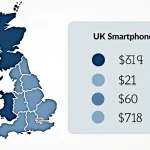The impact of voice search adoption on UK marketing strategies
Understanding the shift beneath consumer interactions
Voice search adoption UK has transformed how consumers seek information, leading to profound marketing strategy changes. Unlike typing, voice queries tend to be more conversational and longer, compelling marketers to adapt content for natural language processing. This shift demands a focus on long-tail keywords and question-based phrases that mirror everyday speech.
Topic to read : How Can UK Computing Trends Influence Effective Marketing Strategies?
The scale and speed of voice search adoption in the UK have accelerated rapidly, influenced by widespread use of smart speakers and mobile voice assistants. Brands now prioritize optimizing for voice technology influence by enhancing local search relevance and featured snippet presence—key to capturing voice-driven traffic.
Marketing tactics among UK brands have evolved, incorporating structured data and schema markup to help voice assistants accurately parse information. Additionally, there’s a push toward delivering concise, clear answers aligning with voice search’s preference for quick, precise responses.
Also read : How can UK companies use gamification to boost customer interaction?
In essence, voice search adoption UK compels marketers to rethink SEO and content strategies, ensuring they meet new consumer expectations shaped by voice technology influence. This trend underscores the necessity for brands to stay agile, embracing voice-friendly approaches to maintain visibility and engagement.
Evolution of SEO and content strategies with voice technology
Voice search SEO has transformed traditional digital marketing by prioritizing how people speak rather than type. Unlike conventional keyword targeting, voice search relies heavily on conversational keywords that mimic natural speech patterns. This shift means optimizing content to address questions in a more direct and personable manner, aligning closely with how users actually interact with voice assistants.
Successful content optimization for voice now demands a focus on long-tail keywords and phrases often found in everyday conversation. These are typically longer and more specific than typed keywords, improving the chances of matching voice queries. For example, instead of optimizing for “best restaurants,” content creators should target phrases like “where can I find the best Italian restaurant near me?”
Additionally, content must address clear, spoken questions users are likely to ask. This involves structuring answers concisely and ensuring relevance to voice-driven queries to capture featured snippets or vocal responses. Focusing on natural language enhances user engagement and aligns with the evolving algorithms prioritizing context over isolated keywords, thereby maximizing visibility in voice search SEO.
Examples of UK brands leveraging voice search technology
Voice search technology is reshaping how UK brands engage consumers. Several UK brands have pioneered innovative voice assistant campaigns, demonstrating the powerful role voice search plays in marketing. For example, major retailers and service providers use voice search to enable faster product discovery, improving customer experience through seamless interaction with voice assistants.
Early adopters integrated voice technology by creating personalized prompts and interactive dialogues tailored to their audiences. This approach boosted brand recall and stimulated engagement, often sparking social media conversations that extended campaign reach. One notable technique involved embedding voice commands into apps and devices, driving convenience and deeper user interaction.
Key lessons from these case studies underline the importance of clear, concise voice commands and the need for ongoing optimization based on user feedback. Brands found that understanding their target audience’s natural speech patterns led to more effective voice interactions. Furthermore, integrating voice search with other digital channels strengthened the overall marketing strategy, making campaigns more resilient in a competitive market.
Embracing voice assistant campaigns offers practical benefits, empowering UK brands to lead in digital innovation while enhancing consumer engagement.
The role of technology advancements in shaping the marketing landscape
Advancements like voice recognition technology and AI in marketing are transforming how brands connect with consumers. Voice recognition technology enables marketers to engage users through natural language, making interactions with smart devices more intuitive. For example, smart speakers integrate seamlessly with everyday life, offering personalized shopping recommendations and interactive brand experiences.
The growing presence of smart speakers and mobile devices drives a shift toward voice-activated marketing strategies. This harnesses consumer habits on-the-go, responding swiftly to voice commands and inquiries. Technological trends UK show rapid adoption rates, highlighting the region’s readiness to embrace these innovations.
Looking ahead, anticipated technological progress will further personalize marketing campaigns by analyzing data patterns with AI. Predictive analytics, combined with voice recognition, will help brands target audiences with precise timing and context, boosting engagement and conversion rates. Marketers who adapt to these shifts can create competitive advantages by tailoring messages through these smart, technology-powered channels.
Changes in consumer behaviour driven by voice technology
Voice technology is significantly shaping consumer trends in the UK, with more people adopting voice search habits for everyday tasks. Users now expect seamless, quick responses when interacting with voice-enabled devices, whether for information retrieval or making purchases. This shift reflects a preference for hands-free convenience and faster interaction, especially on mobile devices.
In the UK, many consumers use voice assistants to check product details, compare prices, or place orders, indicating increased reliance on voice technology in shopping journeys. The immediacy of voice search habits encourages brands to optimise content for natural language queries, impacting how consumers find and choose products.
However, privacy concerns and trust barriers remain critical issues limiting full adoption. Users often worry about data security and how their voice information is stored and used, influencing their willingness to interact extensively with voice devices. Addressing these concerns by enhancing transparency and control is essential for wider acceptance.
Overall, understanding evolving user expectations in the UK helps businesses tailor voice-enabled experiences that align with consumer behaviour, driving both engagement and satisfaction.
Practical advice for marketers adapting to voice search in the UK
Adapting your UK SEO strategy to voice search requires focusing on natural language and conversational queries. People speaking to voice assistants often use longer, more casual phrases than typed searches. For example, instead of “best coffee shop London,” they might say, “Where can I find a good coffee shop near me?” Marketers should optimise website content for such conversational tones and incorporate location-specific keywords to capture local voice search traffic.
Applying voice search marketing tips means revising FAQs and creating content that directly answers common questions UK users might ask. Integrating structured data and ensuring mobile-friendliness are also critical tactics for better voice search performance. Understanding the context behind queries helps design advertising campaigns that feel natural rather than forced, increasing engagement.
To track success, employ tools that allow in-depth voice search performance measurement. Analyse key metrics such as featured snippet appearances and the click-through rate on voice-activated results. This data provides insights into how effectively your marketing tactics for voice capture your target audience, enabling continuous optimisation for the evolving voice search landscape in the UK.
Future trends and predictions for voice search in UK marketing
The future of voice search UK points to significant growth, driven by continuous advancements in voice tech evolution. Analysts predict that by the mid-2020s, over half of all internet searches in the UK will be voice-activated, signaling a major shift in how consumers interact with brands. This growth will intensify competition among businesses striving to optimize for voice search and deliver seamless, conversational experiences.
Marketing predictions emphasize that voice search will open new opportunities such as personalized audio content, localized search optimization, and voice-activated shopping. However, challenges remain, including adapting to natural language variations and ensuring data privacy compliance. Marketers must anticipate these hurdles while integrating voice technology into multi-channel strategies.
Preparing marketing strategies for next-generation voice technology involves updating SEO practices to prioritize long-tail conversational queries. Brands should invest in AI-driven voice assistants and develop content tailored specifically for auditory consumption. Understanding user intent via voice analytics will further refine targeting and engagement, ensuring campaigns remain relevant in a voice-first world. Embracing these trends early will position UK marketers at the forefront of the evolving digital landscape.






